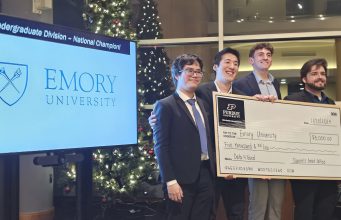Before she worked as a diversity, equity, and inclusion (DEI) manager at Tiffany & Company; before Deloitte and her first job at the United States Department of Agriculture (USDA), Sasha McNair 25MBA was a ballerina.

At a young age, McNair discovered a love and passion for dance. That passion led her to perform at iconic venues like the White House, the Kennedy Center, and the National Gallery of Art.
“I’ve been dancing since I was seven years old,” says McNair. “In my adult life, it has become my safe space and my happy place. Performing is in my blood.”
Now, McNair is performing a different role. She is a student again, pursuing her master’s degree in business administration at Goizueta Business School.
“After almost 10 years out of the classroom, I didn’t realize it was a muscle that I would lose,” she jokes. “It feels good to know that in some respects, I still have it. I will continue to lean into my strengths while savoring the moments that take me out of my comfort zone.”
A Purpose-Driven Path
McNair, a Washington D.C. native, was drawn to Goizueta because of its Business & Society Institute, particularly the Start:ME accelerator program. She says Start:ME evens the playing field for budding entrepreneurs.
“Atlanta is also a city of endless growth and opportunity across industries. That’s what makes it the perfect place to boost your career.”
McNair says she spent her first semester getting reacquainted with homework and group projects. But she’s no stranger to stepping outside of her comfort zone. She spent the last decade forging a unique and somewhat new career path as a DEI strategist.
When I graduated from college, I knew I wanted to be in a career helping people.
Sasha McNair 25MBA
While working at the department of agriculture, she spent time analyzing the data around food deserts in America. In doing so, she sought ways to give these communities access to the government’s nutrition-assistance programs.
“When I transitioned into DEI full-time, I realized that I could focus on inequities not just within access to healthy food, but also access to healthcare, jobs that pay a living wage, and affordable education,” says McNair. “These basic human rights are inaccessible at higher rates to those who look like me, which is even more motivation to do this work well.”
Driving Change from Within
In 2020, while the world was dealing with the COVID-19 pandemic, America was also undergoing a social justice reawakening, says McNair, leading companies to reanalyze their diversity, equity, and inclusion efforts—if they had them at all.
These efforts bleed into all areas of a corporation, from recruiting and retention to performance evaluations and promotions.
That year, McNair was working at Deloitte. Due to her DEI work for the company’s federal practice, McNair and her team were asked to create an anti-racism strategy for the U.S. firm. Her team worked alongside the CEO’s office, a pivotal criteria for a successful DEI strategy.
Strategy is only successful when the DEI team is given the full power of the C-suite. There needs to be a chief DEI officer at the highest level of the organization for the strategy to lead to real progress.
Sasha McNair 25MBA
McNair’s work at Deloitte is a great example of real progress. The team’s efforts created the foundation for the Black Action Council. It’s an internal initiative that fosters a sustainable anti-racism culture and supports Black professionals inside and outside the office. The success of that council led Deloitte to grow its external DEI consulting services offered to federal clients.
“When President Biden created equity mandates for all federal agencies, I led the development of an official DEI practice. That grew from five employees to more than 100 in less than six months,” recalls McNair. “In 2022, the federal practice became the leading generator of revenue for DEI services at Deloitte.”
Back to School
McNair had made great strides, including landing a role as the DEI manager of global talent acquisition at Tiffany & Company,. Even so, she felt as though her career had reached a plateau. Something needed to change.
There’s a certain point you get to where you feel that you need to elevate yourself to a higher level to be truly influential.
Sasha McNair 25MBA
“Strategies are only successful when senior executives are not only bought in, but when they’re also heavily involved in the implementation,” says McNair.
In order to better connect with these leaders and executives, McNair decided to spend two years learning the hard skills of business. To speak the language of an executive, she realized she needed to understand finance, accounting, and how to create a business case for her strategies. With the right data, she could more clearly highlight the return on investment of DEI initiatives.
“This work is ever-changing. Global economic mobility is going to be a huge next step within the DEI space, especially assessing the opportunities to create equity socioeconomically around the world,” predicts McNair.
Right now, I’m surrounded by people who want to do good in the world. It says something about Emory that each of their selected students don’t only want to be successful in business. They also want to be the change-makers, making waves on an international scale.”
Sasha McNair 25MBA
Learn more about diversity, equity and inclusion at Goizueta. Then, find out how an MBA from Goizueta can help you become a change-maker in your career.










